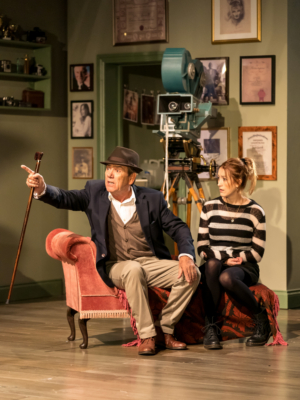Review: PRISM, Richmond Theatre

![]() Unless you are a seasoned movie buff, it is unlikely you will have heard of Jack Cardiff. However, this great British cinematographer had a seismic effect on the way in which we view films, having been the first person to shoot a Technicolor film in Europe. He worked on films such as Black Narcissus and The Red Shoes, filling the screen with previously unseen levels of colour and saturation.
Unless you are a seasoned movie buff, it is unlikely you will have heard of Jack Cardiff. However, this great British cinematographer had a seismic effect on the way in which we view films, having been the first person to shoot a Technicolor film in Europe. He worked on films such as Black Narcissus and The Red Shoes, filling the screen with previously unseen levels of colour and saturation.
In Terry Johnson's play, Prism, we visit Cardiff in his declining years, as dementia robs him of his present, but also returns him to his colourful past.
We meet Cardiff as his son Mason has converted his garage into a memorabilia retreat so Cardiff has somewhere inspirational to finish his memoirs. Surrounded by beautiful images from his illustrious career, Cardiff becomes increasingly bewildered and sucked back into the past to revisit various points in his life, much to the frustration of both Mason and his wife Nicola.
After a successful run at the Hampstead Theatre in 2017, the play is now embarking on a national tour. It is fortunate for audiences that Robert Lindsay has reprised his role as Cardiff. Lindsay suggested Cardiff as a subject to Johnson and Johnson wrote the play with Lindsay in mind for the main role.
Lindsay is effortless charismatic, with a humanity and vulnerable core that is perfectly pitched. He shows a distinct but subtle shift between the various depictions of Cardiff: beginning the play as slightly forgetful but still vital, showing suave charisma and character as his mind drifts back to the past and finally sliding further into confusion as his illness takes hold.
The concept of drifting between the past and present is well-executed and obviously very logical in a play about dementia. However, there is an assumption that the audience already knows all the stars of old Hollywood who Cardiff worked with. It would be interesting to know how much of the audience have actually seen The African Queen, let alone know who the stars were having relationships with at the time. Indeed, Cardiff's own carer Lucy acknowledges her ignorance of 'old films'.
Tara FitzGerald is convincing as his wife Nicola, played in the Hampstead Theatre run by Claire Skinner. Fitzgerald is adept at portraying the deep frustration at her husband's decline and also at his occasional belief that she is Katherine Hepburn, who is always felt was a challenge to her. However, her accent as Hepburn is a little inconsistent and needs more projection.
There is also an interesting relationship between Cardiff and his endlessly-patient carer Lucy, played by Victoria Blunt. Cardiff has poignant moments of clarity with her, as she continues to talk to him about her own life and problems. Blunt is sympathetic and likable as Lucy, but also surprises with an excellent depiction of Marilyn Monroe.
Olivier Hembrough is overly forceful as son Mason, frustrated by his father's reluctance to write down his experiences. His depictions of Arthur Miller and particularly Humphrey Bogart are much more successful.
With the subject matter of dementia, there is an inevitable comparison between this play and Florian Zeller's bewitching The Father. Prism lacks the visceral gut-punch of Florian's play, but offers an adept portrayal of mental confusion, with beautifully depicted lapses from the present to the past. It is also darkly funny, with Cardiff almost relishing his foul-mouthed persona.
Terry Shorthall's clever design first shows the beautiful and luminous photographs of the female stars Cardiff worked with, such as Katherine Hepburn and Marilyn Monroe, pinned up around the garage walls. There is also his trusty and now-obsolete Technicolor camera, the house for the legendary prism that defined Cardiff's work.
There is an artful change in Act II from the interior of the garage to the tropical jungle where Cardiff filmed The African Queen and then again out to filming the glittering sea at night as the play closes. Ben Ormerod's lighting is beautiful, especially as Cardiff sets up atmospheric photo shoots for Nicola and Lucy.
Despite the assumptions that this play makes about the knowledge of the audience, this is a touching and poignant production with flashes of black comedy. It is also a suitable tribute to a man who many of us should know more about.
Prism is at Richmond Theatre until 19 October, then touring
Photo Credit: Manuel Harlan
Reader Reviews
Videos

